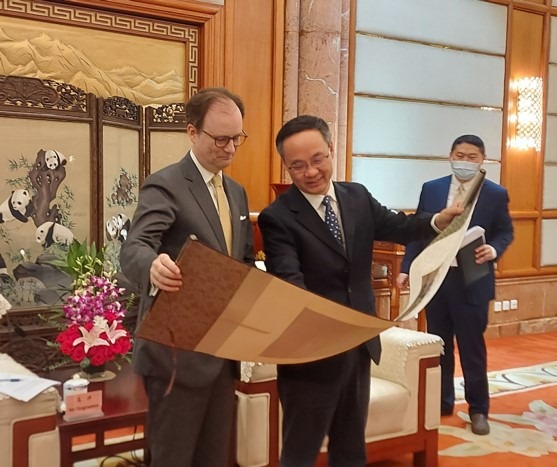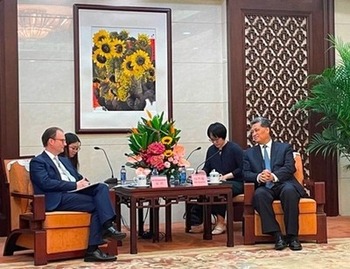We continue our series about the 50th anniversary of diplomatic relations between Belgium and China. In this article we introduce H.E. Mr. Jan Hoogmartens, Belgian Ambassador to China. It is the first edition of interviews with Belgian diplomats in China. Part 2, the interviews with the Consul Generals in Shanghai (Bruno Jans) and Guangzhou (Luc Truyens), will follow later this year.
1. The past year must have been quite an experience for you. You had to start your assignment in Beijing in the midst of Covid-19. How did you and your family cope with this unusual situation?
Under normal circumstances I would not have minded to be locked-up at home with a couple of good books to read. However, it is rather stressful if you have to bear the responsibility for an entire embassy and constantly have to check your e-mails and give instructions to staff by telephone. Apart from that, I must admit that I was looked after very well and I am very grateful for that to everyone involved.. Times have changed and what was possible last year is no longer possible. The quarantine measures have been tightened even further, which would make it even more difficult for me to function as an ambassador during quarantine.
2. Before becoming a diplomat, you already had a successful academic career, partially even in China. From 2013 to 2016 you were Visiting Professor of International Economic Law at the China University of Political Science & Law in Beijing and from 2008 to 2013 Adjunct-Professor of Law at the Zhejiang Gongshang University in Hangzhou. Some of the articles and books on EU trade law were even published in the Chinese language. I understand you even visited China already as a student in the early nineties. Could you describe how different it is to work in China as a diplomat from working in China as a professor or travelling there as a tourist? It is true that I have been exposed in different capacities to the Chinese culture, its way of living, working and thinking over a period spanning for about 25 years now. I have made many good friends during these times. I still cherish all the wonderful memories of my travels, my encounters and my studies. I still believe that it was a wise decision to come to study in China at the end of the 1990s and I certainly have no regrets. It opened a new window on the world for me. Officialdom of course has an impact on how I now have to bear certain responsibilities and it has also changed my daily life. You are an Ambassador 24 hours a day and 7 days a week. These are testing times for everyone who is involved in Sino-European relations. I respect my mission and it requires me to navigate prudently. I hope others will understand and agree with me on this.
3. In what form is China different from what you expected, both in terms of your work situation as well as living in China? I don’t believe the Chinese people have fundamentally changed. And I also have no expectations from them in this regard. They do not have to become different people. Their conditions have changed of course. I rejoice in the fact that China has made great economic progress. It is not unusual for a country undergoing such a profound transformation to experience also changing political circumstances. I do not believe in Chinese exceptionalism though. I think Chinese and Belgian people share the same objectives. They want to live in a prosperous society and enjoy all the ensuing benefits. The tension between the economic foundations of a society and the political construction on top of it is the very essence of Marxism. The construction has to follow the foundations and not the other way around. I only hope the building will not collapse if it does not want to give in. Both in the West and in China I see cracks in the wall.
4. The relationship between Belgium and China has always been quite strong, with many Belgian investments in China or Chinese investments in Belgium and many successful activities in trade, cultural exchange and other forms of Sino-Belgian relations. How do you see this from your perspective? Despite 5 decades of diplomatic relations, Belgians and Chinese alike still have a lot to learn and to discover about each other. I try to contribute to China’s discovery of Belgium as a country of great sophistication. Belgium is a country with pioneering companies and industries, the investments of which go back to the very early days of China’s Reform and Open Door Policy. Belgium is a country with some of the world’s oldest universities, the students and professors of which are making exchange visits and promoting academic excellence in research and innovation. And last but not least, Belgium is a country of high culture with some of Europe’s finest cultural heritage sites and a rich gastronomical tradition. Similar things can also be said about China, and that is why I believe that we can still share and exchange between peoples for the future.

5. Looking at the future, how do you see this relationship developing and what are the challenges and opportunities for Belgian companies or organisations when doing business with China? Should we be optimistic or pessimistic? Any suggestions or recommendations you have? Belgium and China are long lasting partners. Belgian companies have been investing for over 40 years in China. Meanwhile, we see more and more Chinese companies investing in Belgium. Indeed Belgium has many advantages for Chinese companies. First of all, our location is right in the middle of the richest and wealthiest area in Europe. Second, the Belgian population is one the most productive in Europe and is well-qualified with top-ranking scientific research centers helped by the excellence of its universities. Finally, Belgium has a very high quality of life and is truly open to the world, with several international organizations, large diplomatic community and many international schools. Of course there are challenges, both ways, and we value the discussions at bilateral, European and international level, in particular at the World Trade Organisation, to improve business climate and level playing field. Belgium and China share a long history and have strong trade and investment ties. Our two way trade has increased constantly and in 2020 amounted more than 26.5 billion €. Over the last 20 years, BE exports multiplied eightfold from just under 1 billion € in 1999 to reach 8.5 billion in 2020. The categories of goods remained and are relatively diversified, both ways : chemicals, machines and equipment and plastics. After 50 years we enjoy a mature relationship. This allows us to express concerns and discuss issues whenever they arise. Our bilateral trade remains unbalanced though and represented more than 9 billion € in 2020. Despite these unbalances, we focus more on a balanced and equitable treatment for companies than on a balanced flow of goods. Belgium is an open economy and so is Europe.
6. As the biggest Sino-Belgian business community the Belgian-Chinese Chamber of Commerce (BCECC) tries to create a better understanding between the two countries by organising all kinds of events, such as seminars, webinars, delegations’ visits, etc. Do you have any comments about the importance of an organisation like ours in the relationship between Belgium and China? We very much value the work and activities of the Chambers of commerce and their network. The chambers are the voice of the companies and it is crucial for us to be able to understand their preoccupations and concerns as well as to discuss and to explain current evolutions and developments. The BCECC adapted its way of working and communicating with its members to the new world, through covid-19 pandemic. The Chamber organises a lot of online events. When offline events will resume, this capacity of organising online events will certainly increase the relevance and the impact of the Chamber’s work and activities.

7. Finally, could you share with us some personal story about your China presence in the past year? Any private encounters or experiences which are typical for China or which made you love (or hate) the country? I guess I already had my culture shock more than 20 years ago (laughs). It did not prevent me from coming back to China. (big smile) I always feel reinvigorated by the dynamism. I had a chance to visit Chengdu and Shenzhen recently. To see bustling cities full of young urban residents seeking their individual path of development in society makes me feel hopeful. I guess I sound very old to your readers now (laughs out loud).
